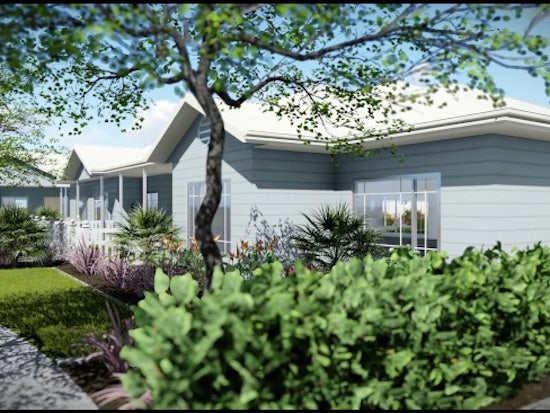Synovum Care Bellmere facility to provide ‘inclusive’ dementia care
Synovum Care is preparing to open the world’s first inclusive village for residents with dementia and other complex needs in Bellmere, Queensland before the end of the year.

Synovum Care’s Bellmere development consists of 17 houses where up to 7 residents live in a domestic-style house (Source: Synovum Care)
The award winning design of the Bellmere facility seeks to provide residents with as normal a life as possible, in particular those people living with a diagnosis of dementia.
Synovum Care Group Managing Director Natasha Chadwick says design of the new facility has been based on worldwide research into caring for dementia sufferers.
“Unlike traditional large residential aged care models, Synovum Care’s Bellmere development consists of 17 houses where up to 7 residents live in a domestic-style house, each of which has a fully functional kitchen, dining room, laundry and sitting rooms,” Ms Chadwick says.
“Both supported and non-supported residents will live in the community and be assisted as needed by House Companions in their day to day activities such as cooking, cleaning, personal care and medication management.
“All of this has been designed to create what we call ‘small scale living’ and provide residents as normal a life as possible.”
The facility will staffed by a team of registered nurses, physiotherapists, exercise physiologists and dementia support specialists. Residents will also have access to a corner store, cafe, hair and beauty salon, barber, cinema, fitness centre, men’s shed, dental clinic, GP office onsite.
“Freedom of movement is critical and our approach provides that in a safe, dignified and familiar environment with individualised services that are underpinned by a wellness and empowerment approach,” says Ms Chadwick.
“Sophisticated technology, developed collaboratively with a number of providers, facilitates a ‘dignity in risk’ approach to help us achieve our vision of freedom of movement, allowing residents to undertake ‘normal’ daily living activities.
“Team members are there to support the residents who choose to participate in activities while our monitoring system can detect any unusual resident movement without compromising their dignity.”
The site will be fitted with a wireless monitoring and communication, including bed exit sensors, wireless tags and real time location updates. Residents will be monitored by 24 hour CCTV to ensure the safety of wandering residents, while each unit will also be fitted with a kill switch to turn off forgotten appliances for extra safety.
Outdoor areas make up 50 percent of the Bellmere facility, including accessible parks and gardens, promoting an active community.
“Consumers want more choice, they are not and will not accept a blanket one size fits all approach, nor should they. They want to live a normal life and not be isolated to a dementia unit,” Ms Chadwick says.
“A smaller, less clinical environment provides people living with dementia with the right prompts to live as normal a life as possible, yet service providers continue to build larger living environments in large institutional developments, even though dementia care is considered core business for a residential aged care providers.”
The site, which is due to open in August this year, has already received the 2017 Ageing Asia’s Facility of the Year award, and was a finalist in the Innovation of the Year category.























